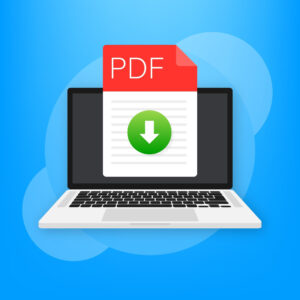Yes, even small companies may need to change daily administration to comply with revised electronic book preservation act in Japan. This revision will come into force on 1st January 2024.
So, all business owners are supposed to get ready for the change. However, many companies especially small companies and sole proprietor are not prepared and some companies are even not aware of this revision. Taking account of this delay in preparation, the government relaxed the requirements of this revision in 2023.
For example, Grace Measure will apply if companies cannot install new systems or workflow to preserve Electronic Transaction Data due to a “Valid Reason“. And small companies whose annual sales a of 2 fiscal years ago are 50 million yen or less are exempted from some obligations as explained in this Article.
- What companies need to do to comply with the revised Electronic Preservation Act in Japan
- Difficulties in preservation of Electronic Transaction Data.
- What is Grace Measure and Valid Reasons
- The Simplest way to fulfill the requirements of the revised Electronic Book Preservation Act in Japan.
This Article was written by ATSURO TSUJINO (Attorney at Law of Ashita no Shishi Legal Office)
What Companies need to do to comply with the revised Electronic Preservation Act in Japan
Before explaining the relaxation made in 2023, let us explain the basic concept of the revised Electronic Preservation Act in Japan. This Act describes three matters:
1. Preservation of Accounting Books and Documents prepared with a Computer
 If accounting books and documents are prepared with a computer or other electronic device, they can be stored as data without printing them out.
If accounting books and documents are prepared with a computer or other electronic device, they can be stored as data without printing them out.
Following documents can be preserved as data:
- General Journal(仕訳帳), Ledger(総勘定元帳)、Expense Journal(経費帳)、Sales Journal(売上帳)、Purchase Journal (仕入帳) created with accounting software
- Financial Statements such as Profit and Loss Statement(損益計算書) and Balance Sheet(貸借対照表) created with accounting software
- The copy of quotations, invoices, delivery slips, and receipts, if you created those documents with your computer and gave the printed documents to your business partners.
There are some rules for preservation of accounting books and documents. For details, please check the website of National Tax Agency.
2. Preservation of Scanned Documents
 Revised Electronic Preservation Act allows your company to scan receipts, invoices, contract, purchase order, delivery slips etc., and preserve them as electronic data instead of keeping the printed documents.
Revised Electronic Preservation Act allows your company to scan receipts, invoices, contract, purchase order, delivery slips etc., and preserve them as electronic data instead of keeping the printed documents.
You can also save scanned copies of transaction documents that you have handwritten and given to your business partners in paper form.
For companies that constantly conduct a large volume of transactions, obligation to preserve books and documents in paper form is a huge burden, and paper takes up limited space in the office.
The full acceptance of electronic data storage will be a great benefit to many companies.
There are some rules for scanning and preservation of the data. For more details, please check the website of National Tax Agency.
3. Preservation of Electronic Transaction Data
 Electronic Preservation Act is NOT only to facilitate the implementation of electronic data preservation.
Electronic Preservation Act is NOT only to facilitate the implementation of electronic data preservation.
The laws made it mandatory to maintain electronic data of transaction data you received via email or on the internet.
Therefore, invoices, receipt, or other transaction documents downloaded from e-commerce websites such as Amazon or Rakuten, and PDF invoices exchanged with business partners via e-mail must be saved as electronic data, and saving only printed document is prohibited.
Difficulties in preservation of Electronic Transaction Data
As we explained, 1. Preservation of Accounting Books and documents created with computer, and 2. Preservation of Scanned Documents above are NOT mandatory. Therefore, your company don’t need to change current practice to paperless storage.
On the other hand, 3. Preservation of Electronic Transaction Data is mandatory. Now, many companies are struggling to fulfill the requirements for 3. Preservation of Electronic Transaction Data, because there are strict rules for the preservation.
Measure to Prevent Falsification and Manipulation
In order to prevent falsification and manipulation, files such as receipts and invoices stored as electronic data are required to do one of the following treatments:
- Time stamp them promptly;
- Save them in a system that can keep a history of corrections and deletions, or in a system that does not allow corrections and deletions; or
- Establish administrative rules regarding the prevention of corrections and deletions of electric data without justifiable reasons, and operate in accordance with such rules.
So, if you choose No.3 above, you don’t need to introduce new systems. But many companies are introducing new system to do Time Stamp on each electronic data. The systems have to meet certain requirements of this law. JIIMA certifies that software services meet requirements of Electronic Book Preservation Act. So, you can choose one from JIIMA certified system from the website of JIIMA
Search Function of Electronic Transaction Data
Furthermore, companies need to keep transaction data searchable according to (i)date, (ii) amount, and (iii) counterparty. To meet this requirement, companies can choose one from the following methods:
- Implement a system that allows such electronic data to be searched by amount, client name, or date;
- Create a list of electronic data in Excel format and link it to the stored data; or
- Name each electronic data file for easy retrieval and store them separately by each fiscal year.
What is Grace Measure and Valid Reason
Grace Measure will apply if there is a Valid Reason
As explained above, companies need to take some measures for preservation of electronic transaction data such as introducing systems or workflow to prevent falsification and manipulation and keep the data searchable. However, many companies especially small companies are not yet ready because introducing new systems or workflow is not easy.
As grace measure, if a company cannot timely fulfill the requirements of Electronic Book Preservation Act for valid reasons, they are not required to install new systems or work-flow to prevent falsification and manipulation and to keep electronic data searchable.
Criteria of Valid Reason
Then, What can be a “Valid Reason”?
According to Q&A published by National Tax Agency, if a company cannot timely introduce systems or work flow to preserve electronic data in accordance with Electronic Book Preservation Act due to financial difficulties or lack of human resources, Tax office will consider that the company has a valid reason. So, financial difficulties or lack of human resources can be a valid reason.
But it is still not clear that what level of difficulties or insufficiencies are required. In the end, Head of local tax office determine in its discretion whether there is a valid reason for each company.
And, we don’t know how long national tax agency will permit the delay. This Grace Measure must be a temporary measure for a while after the enforcement of the law.
What companies need to do at least.
Even if a company has a Valid Reason, they need to do at least following things to meet minimum requirements of Electronic Book Preservation Act:
- Prepare a printed document of the electronic transaction data so that it can be presented and submitted at the time of the tax audit; and
- Be ready to download and submit electronic transaction data to tax officials when requested to do so.
The Simplest way to fulfill the requirements of the revised Electronic Book Preservation Act in Japan.
As we discussed, you can set aside of electronic data related to 1. Preservation of Accounting Books and documents prepared with computer, and 2. Preservation of Scanned Documents, because they are not mandatory.
So, we will explain the simplest way to fulfill the requirements related to 3. Preservation of Electronic Transaction Data.
Establish administrative rules to prevent falsification and manipulation.
As explained above, companies need to take some measures to prevent falsification and manipulation of electronic data. But introducing new systems take some costs and it could be heavy burden for small companies. So, as an option, Electronic Book Preservation Act allows companies to establish administrative rules to prevent falsification and manipulation of electronic data instead of instroducing new system.
The rule must restrict corrections and deletions of electric data without justifiable reasons. And of course, every manager and employee needs to operate business in accordance with the administrative rules. The sample of such rules can be found and downloaded from the website of National Tax Agency. Sample for Company Sample for Sole Proprietor
If annual sales of your company is 50 million yen or less
Thanks to the relaxation made on 2023, company whose annual sales of 2 fiscal years ago is 50 million yen or less are not required to introduce search function of electronic transaction data. However, even in such case, your company needs to be ready to download and submit electronic transaction data to tax office when requested to do so.











